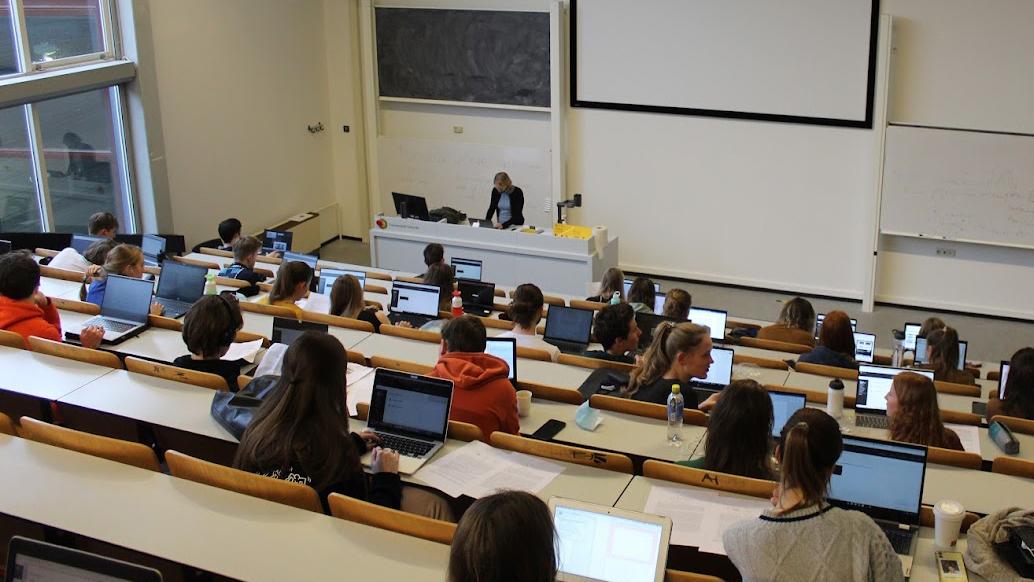DUB panel doubts
Skipping lectures: a personal choice or a challenge for the university?

In the first few weeks of a course, the lecture halls are packed, but interest quickly wanes as the term progresses. All members of the DUB panel can relate to this statement and the vast majority of them are disappointed about it. Biologist Suzan Ruijtenberg says: "A course is designed as a whole, and the end is no less important than the beginning." Philosopher Floris van den Berg adds, "As a lecturer, I find the low level of frustration among students frustrating."
Psychology student Levi Bierhuizen tells DUB in an email: "Every new term feels like a fresh start, with students setting out with the best of intentions. Unfortunately, just like in the weeks after New Year's Day, most find out that their resolutions are more difficult to maintain than they thought."
DUB panel member Kirsten Buist reports that the Educational Sciences programme has even cancelled the lectures for some courses due to poor attendance, "despite the fact that those courses were originally set up at the request of students and in response to course evaluations."
The hidden curriculum
Many panel members note that most students attempt to determine the minimum requirements for passing the exam. If it turns out that attending lectures and seminars is not necessary to pass, they simply stop showing up.
Student Emma Ravenhorst gives a "notorious example" from her Bachelor's degree in Law. "Unfortunately, a good set of Law books gives you a better chance of succeeding at the exam than attending lectures every week, although the lectures are much more interesting and intellectually stimulating." (Law books contain summaries and exam training tailored to UU's Law programme, Ed.). Ravenhorst: "I don't rule out that a different form of assessment would lead to a different attendance rate."
Philosophy lecturer Floris van den Berg refers to what educationalists call "the hidden curriculum": the minimum requirements to pass the course. "The hidden curriculum is a lot more limited than the official curriculum, in which the lecturer assumes that the student will attend all the lectures, complete all the assignments, read all the required literature and, ideally, the recommended literature as well."
Writing like crazy
So, several panellists perceive a lack of intrinsic motivation among students. Looking back on her own experiences as a student, course coordinator Laura Hompus says: "I never really understood why people dropped out. My FOMO and curiosity made it so that I always attended. I set time aside for it – after all, when else are you supposed to absorb that knowledge?”
She also recalls "taking notes like crazy" and "letting my brain process the material. I also found it useful to raise my hand every now and then."
Floris van den Berg calls "the minimalist and instrumental attitude" displayed by students’ worrying. At the same time, he believes that lecturers should take a good look at themselves and wonder whether their lectures are useful and necessary. He makes a passionate plea for traditional lectures. "Nowadays, everything has to be interactive or 'flip the classroom'. When I look back on my studies, I never think of seminars, but I always remember lectures that made a deep impression on me. Would it be a good idea to ban screens (computers, phones) and encourage students to take notes?"
Watch online
Meanwhile, other panellists see possibilities for turning the tide. Suzan Ruijtenberg believes that some students are interested in the course material, but drop out because the lectures are not useful enough, the commute takes too long, or they lose motivation halfway through. "We could do something about this. For example, we could group lectures so that students don't have to commute as much. Another alternative would be to better align lectures with learning needs."
Levi also believes that programmes can influence students' motivation and attendance. "Our seminars are always compulsory, and some lectures cannot be watched online."
Kirsten Buist suggests a few options as well, such as adjusting exam materials, awarding bonus points, and introducing compulsory attendance with attendance lists. "However, these measures are not suitable for all courses and not all lecturers find them a pleasant way of working."
Personal responsibility
At the same time, several panel members point out that students' choices should simply be respected. Ruijtenberg: "Some students drop out in the first few weeks because the course does not suit them or due to personal circumstances. Others stop going because the lecture overlaps with other courses. We can't avoid this: interests change and circumstances are not always predictable."
Buist: "You can also expect young adults to be able to assess whether a lecture is useful or worthwhile for them. If attending costs them a lot of time and effort and yields too little in their view or experience, that consideration will be detrimental to their attendance."
Educationalist Casper Hulshof adds: "Students simply don't have much time (they work extremely hard to pay for their studies), so as soon as they think that they don't have to be here, they choose not to be there. If they are right, I think that's a smart and strategic choice."
According to Emma van Ravenhorst, this dilemma makes sense given the "culture wars and battles being fought at the university." She believes it is a proxy for much bigger questions: "What do we want the university to be? Is the university a continuation of high school, where attendance is compulsory and homework must be handed in every week? Or is university based on intrinsic motivation and students' responsibility to think for themselves and decide what they do and don't show up for?"
Ben ik er niet is het fout ben ik er wel val ik in slaap. Soms moet je een grens tekken: ik kom niet opdagen bij 09:00 colleges.